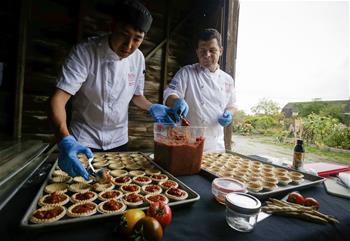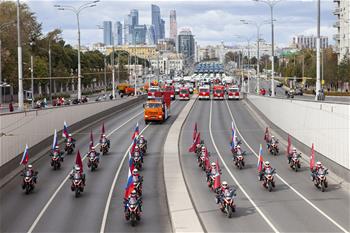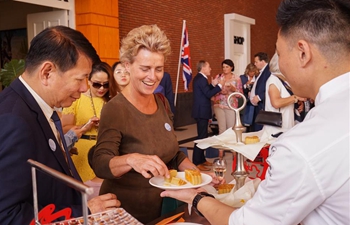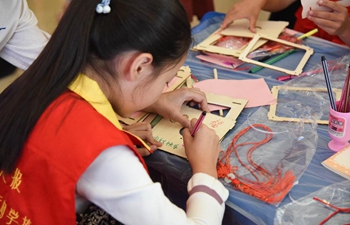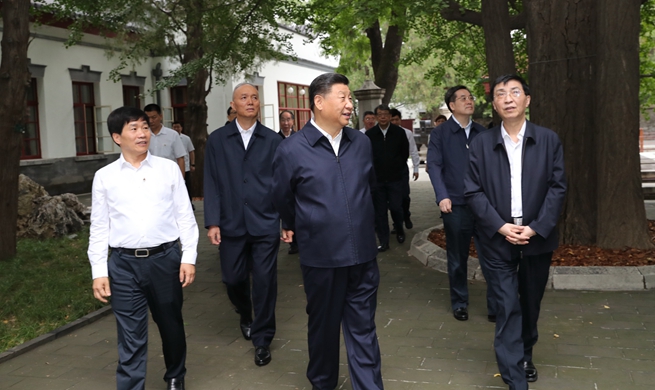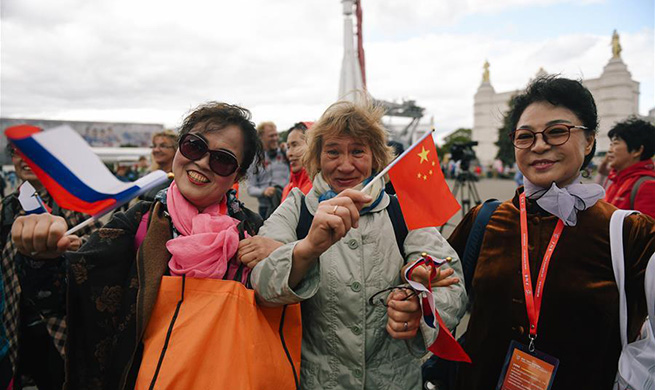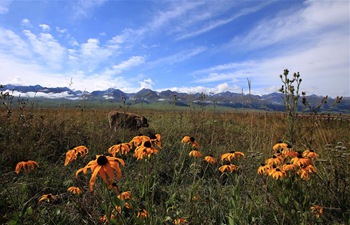by Ndalimpinga Iita
WINDHOEK, Sept. 15 (Xinhua) -- The dawn of light had just arrived over Namibia's capital Windhoek. At a residential dwelling in Goreangab, a settlement in Windhoek, Angela Heinrich toiled her garden. The garden stands out. The plants are organized unconventionally- with strategically cross-planted vegetables, trees, fruit trees, and sunflowers in the same space.
"I practice companion planting with perennial and seasonal plants. In doing so, I ensure that I care for the earth by applying organic compost to fertilize the soil and use water-saving techniques," Heinrich said Saturday.
Companion planting is a principle of permaculture farming.
Heinrich is one of the 24 Windhoek city dwellers trained on permaculture farming technique as part of the pilot phase of Farm Okukuna, one of the five sites allocated by the Windhoek municipality to develop sustainable food systems. The trainees graduated in May this year, upon completion of the one-year-long food growers' course.
Okununa means to sow in local Oshiwambo vernacular.
Ina-Maria Shikongo of Eloolo Permaculture Initiative, an implementing partner that trained the dwellers said that the course covered variant components of permaculture farming.
These included sunken growing beds, rainwater harvesting, seeds, compost, companion planting, transplanting, identification and pruning of trees, setting up a shade structure for a nursery, pest control and patterns.
"Permaculture looks at all components so that all things are connected, from soil preparation, water, the farmer, and the wider ecosystem. So trainees were well-equipped with necessary skills," Shikongo said.
Through the project, said City of Windhoek councillor, Ananias Niizimba, the municipality aims to adopt agricultural techniques such as permaculture that are adaptable to the urban setting and challenging country's dry climate.
Namibia is a semi-arid country and experienced persistent drought since 2013.
Moreover, Niizimba said that a significant number of city dwellers are not able to afford healthy food; hence the climate-smart agricultural project to develop inclusive and sustainable food systems, to address urban poverty in the city and complement broader national food security efforts.
Over 18 percent of the Namibian population lives in extreme poverty, states the 2018 World Poverty Clock.
"The primary objective is to build the capacity of our community to grow their food," Niizimba said.
Heinrich is not the only one reaping the benefits. More residents in Windhoek have adopted permaculture agricultural method to reduce poverty and enhance their household food basket.
Jackson Simon, also trained in permaculture at Farm Okukuna, started his garden at home.
He farms with spinach, cabbage, and tomatoes.
"The yields from my garden have been instrumental in reducing cost towards food, yet my food basket is sufficient, thanks to skills gained during the permaculture training," Simon said.
In a dry climate, he attributes the good harvest to techniques gained about permaculture farming, such as water restoration and harvesting methods.
As his garden grows, Simon plans to expand and commercialize his venture. "I wish to feed more of my family members, and then later supply to the community and venture into business," he added.
Meanwhile, in efforts to enhance the food growers' marketing skills, plans are underway to offer follow-up training on agro-marketing.
"The aim is to empower urban food growers with skills and network; to be able to market their products and gardens - to supply directly to the community and commercial entities," Shikongo said.
Besides her home garden propagating well, Heinrich said some challenges such as the lack of land could limit her efforts.
"But Farm Okukuna could serve as an extension of my efforts. Where I may have limited space, I could work with the project by providing human and material resources to the benefit of our community," Heinrich added.
The food growers are also extending their services to community empowerment. Heinrich also trains other residents in Goreangab on permaculture, giving the project roll-out a snowball effect.
That way, said Niizimba, all parties play a role in empowering communities to drive national development, social progression, and economic prosperity.
Meanwhile, Farm Okukuna is benchmarked to serve as a food marketing, recreation, research, and training center for water-wise urban agriculture in the challenging climate of Windhoek and other skills development training related to food nutrition.
In the interim, the efforts would be complementary to the city's economic development strategy. Fillemon Hambunda, a strategic executive for economic development and community services, said that the Windhoek municipality is underway crafting its economic development strategy, under which food security is one of the five pillars of the strategy to drive urban agriculture.
The establishment of Farm Okukuna is in line with the city's commitment to the Milan Urban Food Policy Pact, to which the City of Windhoek is a signatory. Also, together with partners, the mayor of the City of Windhoek has initiated the Windhoek Declaration in 2014, which was signed by 21 Namibian mayors, and in which they committed to engaging on food and nutrition security governance.
